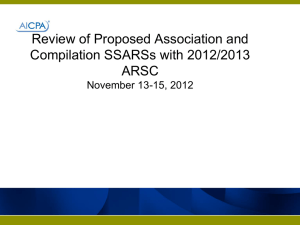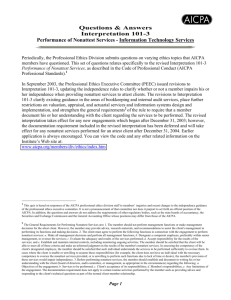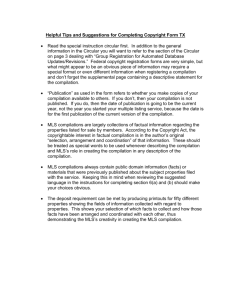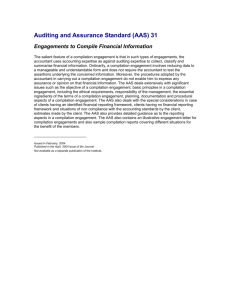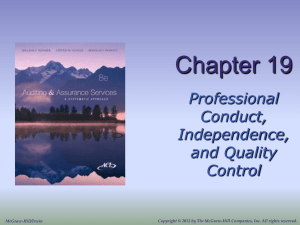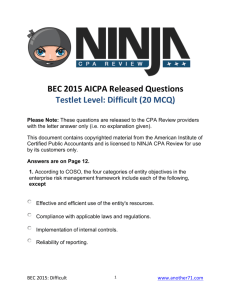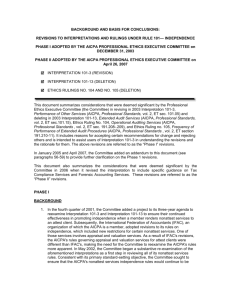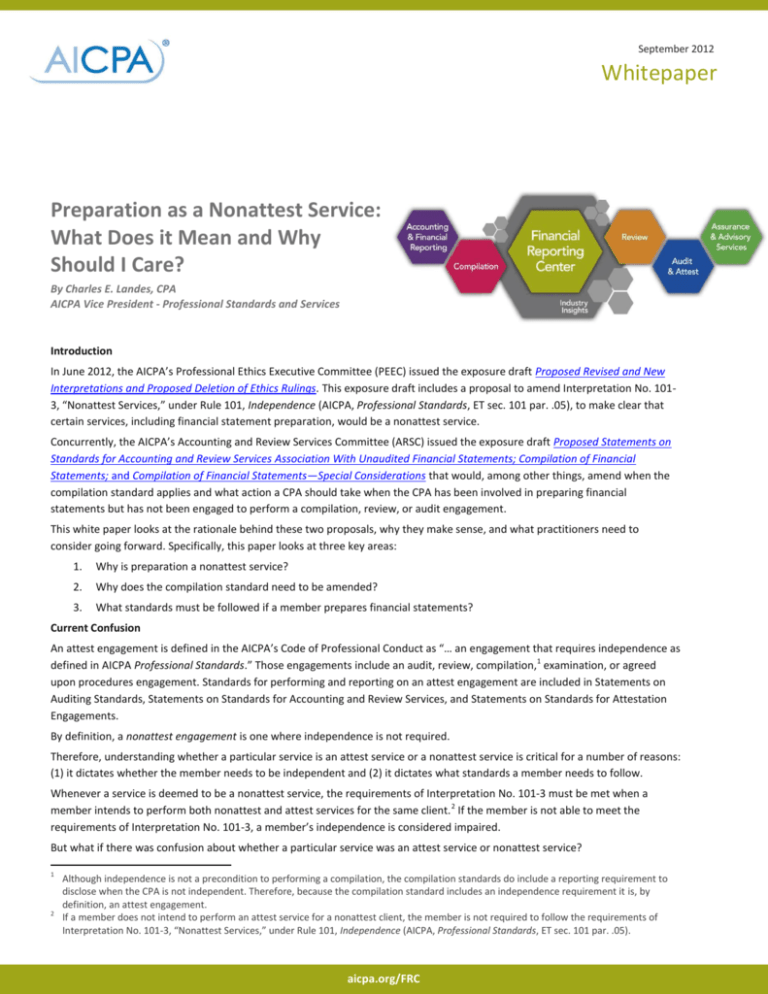
September 2012
Whitepaper
Preparation as a Nonattest Service:
What Does it Mean and Why
Should I Care?
By Charles E. Landes, CPA
AICPA Vice President - Professional Standards and Services
Introduction
In June 2012, the AICPA’s Professional Ethics Executive Committee (PEEC) issued the exposure draft Proposed Revised and New
Interpretations and Proposed Deletion of Ethics Rulings. This exposure draft includes a proposal to amend Interpretation No. 1013, “Nonattest Services,” under Rule 101, Independence (AICPA, Professional Standards, ET sec. 101 par. .05), to make clear that
certain services, including financial statement preparation, would be a nonattest service.
Concurrently, the AICPA’s Accounting and Review Services Committee (ARSC) issued the exposure draft Proposed Statements on
Standards for Accounting and Review Services Association With Unaudited Financial Statements; Compilation of Financial
Statements; and Compilation of Financial Statements—Special Considerations that would, among other things, amend when the
compilation standard applies and what action a CPA should take when the CPA has been involved in preparing financial
statements but has not been engaged to perform a compilation, review, or audit engagement.
This white paper looks at the rationale behind these two proposals, why they make sense, and what practitioners need to
consider going forward. Specifically, this paper looks at three key areas:
1.
Why is preparation a nonattest service?
2.
Why does the compilation standard need to be amended?
3.
What standards must be followed if a member prepares financial statements?
Current Confusion
An attest engagement is defined in the AICPA’s Code of Professional Conduct as “… an engagement that requires independence as
defined in AICPA Professional Standards.” Those engagements include an audit, review, compilation,1 examination, or agreed
upon procedures engagement. Standards for performing and reporting on an attest engagement are included in Statements on
Auditing Standards, Statements on Standards for Accounting and Review Services, and Statements on Standards for Attestation
Engagements.
By definition, a nonattest engagement is one where independence is not required.
Therefore, understanding whether a particular service is an attest service or a nonattest service is critical for a number of reasons:
(1) it dictates whether the member needs to be independent and (2) it dictates what standards a member needs to follow.
Whenever a service is deemed to be a nonattest service, the requirements of Interpretation No. 101-3 must be met when a
member intends to perform both nonattest and attest services for the same client. 2 If the member is not able to meet the
requirements of Interpretation No. 101-3, a member’s independence is considered impaired.
But what if there was confusion about whether a particular service was an attest service or nonattest service?
1
2
Although independence is not a precondition to performing a compilation, the compilation standards do include a reporting requirement to
disclose when the CPA is not independent. Therefore, because the compilation standard includes an independence requirement it is, by
definition, an attest engagement.
If a member does not intend to perform an attest service for a nonattest client, the member is not required to follow the requirements of
Interpretation No. 101-3, “Nonattest Services,” under Rule 101, Independence (AICPA, Professional Standards, ET sec. 101 par. .05).
aicpa.org/FRC
That’s the situation that currently confronts members in public practice who prepare or assist their clients in preparing financial
statements. The confusion is present because both the nonattest literature and the attest literature discuss preparation (or
drafting) of financial statements. Therefore, when a member in public practice who performs a compilation, review, or audit for a
client and the member prepares or assists in preparing the financial statements of that client, the member is uncertain about
whether he or she needs to follow only the compilation, review, or audit standards or whether the member also needs to comply
with the requirement of Interpretation No. 101-3.
Current Ethics Proposal—Making it Clear
PEEC’s proposed amendment of Interpretation No. 101-3 would make it clear than whenever a member prepares or assists in
preparing financial statements for a client that service would be a nonattest service.
Let’s take the situation of a CPA who is engaged to perform a compilation, review, or audit engagement for a small business client.
As is typical with almost all small business clients, the CPA prepares or assists in preparing the client’s financial statements. That
might mean that the member prepares the entire financial statements and accompanying notes, it might mean that he or she
prepares only the statement of cash flows, or it might mean that the member only assists the client in the drafting the
accompanying notes.
Where today the member might not believe that Interpretation No. 101-3 applies because the CPA is preparing the financial
statements as part of an attest engagement, this proposal would require that the CPA treat the preparation as a nonattest service.
Therefore, a CPA would be required to follow the requirements of Interpretation No. 101-3 as it relates to the preparation portion
of the engagement and the compilation, review, or audit standards as it relates to the attest portion of the engagement.
At this point, you may be wondering about the theory behind the change. First, the financial statements have always been
considered the responsibility of management. Therefore, if the financial statements are management’s responsibility,
management needs to be responsible for their preparation. That doesn’t mean they can’t “outsource” the preparation, but it does
mean that they can’t outsource their responsibility. Secondly, independence requirements have never applied to the preparation
of financial statements, whether prepared by a member who works for the client or a member who is in public practice. Finally,
the preparation of financial statements has long been considered to be part of management’s system of internal control over
financial reporting.3
Therefore, it’s logical that our standards should make clear that preparation of a client’s financial statement is a nonattest service
and not a service encompassed within an attest service.
How Does This Impact the Attest Standards?
Assuming PEEC’s proposed change becomes final, the audit, review, and compilation standards will then be amended to make
clear that preparing or drafting financial statements, in whole or in part, is not part of the attest service, but rather needs to be
treated as a nonattest service. For the audit and review literature, this will be a simple fix and can most likely be done as a
conforming change once the PEEC change is finalized. But the change required of the compilation standard is more complex.
How Does This Impact the Compilation Standard Specifically?
Under today’s compilation standard, the accountant is required to comply whenever “… he or she is engaged to report on
compiled financial statements or submits financial statements to a client or to third parties.” Drilling further into the compilation
literature, we see that submission of financial statements is defined as “presenting to management financial statements that an
accountant has prepared.” Therefore, the compilation standard applies today when the CPA is either (1) engaged to perform a
compilation or (2) when the CPA prepares financial statements on behalf of management.
But wait, isn’t PEEC now clarifying that preparation is not part of any attest service but is a nonattest service? The answer you
know from the beginning of this white paper is YES.
That is the conundrum that ARSC faced in light of the PEEC proposal. Where ARSC (and our members) once viewed preparation as
part of the compilation service (that is, preparation is compiling), that view can no longer be valid given PEEC’s clarification.
Preparation can no longer be part of an attest service; rather, preparation will be a nonattest service.
3
Earlier this year, the Professional Ethics Executive Committee removed a requirement from Interpretation No. 101-3 that prohibited a member
from designing or maintaining internal controls. By removing this requirement, it facilitated permitting a CPA to maintain controls over the
preparation as long as management was responsible for the controls and certain other requirements of Interpretation No.101-3 were met.
aicpa.org/FRC
This PEEC proposal, among other events, led ARSC to conclude that it is time to uncouple preparation from compilation. Although
the PEEC decision was enough to move ARSC to consider the uncoupling, other technology changes already had ARSC thinking
that the compilation standard needed to be revised.
For years, members have called the Technical Hotline and inquired at conferences whether they had “submitted” financial
statements. For example, if a CPA was performing bookkeeping services for the client and the client “pushed the button” to print
the financial statements, many CPAs would claim that they have not “submitted” the financial statements. The fact that the client
“pushed the button” meant that the client (or more accurately, the client’s software) prepared the financial statements. Other
CPAs might, legitimately, argue the opposite. So too would some members argue that even if they pushed the button, they didn’t
prepare the financial statements because all they did was prepare adjustments at month’s end. So the arguments over submission
and preparing are arguments that will surely continue if not resolved.
But before preparation of financial statements is discussed further, we need to look at a fundamental question that ARSC
debated—does it make sense to compel a member to follow an attest standard if the member is engaged to perform a nonattest
service?
Let’s explore that key question further. Assume a member is engaged to perform bookkeeping services for a client and that
service results in the member preparing monthly financial statements (all of which will be a nonattest service). In that example,
should our rules compel a member to perform an attest engagement, when the member has not been engaged to perform an
attest service? For example:
Should we compel the member to perform an audit as a result of preparing those monthly financial statements, even
though the client has not engaged the member to perform an audit?
Should we compel the member to perform a review if the member is engaged to perform bookkeeping?
If it makes no sense to compel an audit or a review, why does it make theoretical sense to compel a compilation, when that’s not
what the member was engaged to do?
Taking that example further, does it make sense to compel a member to perform a compilation, review, or audit of an entity’s
financial statements if the member is engaged to perform a tax return of the entity—another nonattest service? I think most
everyone would answer these questions with a resounding NO. Members should be held to the standard for the service that
they’ve been engaged to perform. Neither ARSC nor the Auditing Standards Board should compel a member to perform a
compilation, review, or audit if that’s not what the member has been engaged to do.
Preparation—What Does it Mean and What Standards Would Govern?
If anyone thinks that members should be compelled to perform an attest service and follow those standards when they’ve not
been engaged to do so, the next question becomes which attest standard should be followed and what triggers preparation?
In my travels, I have heard some members express their concern that members should be required to follow the compilation
standard and issue a compilation report whenever they prepare financial statements for a client. When asked why, their response
is that a user wants the assurance that a compilation report provides. Others have voiced that if the compilation standard isn’t
followed, there will be no preparation standards to follow and as a result, the public will receive shoddy financial statements. Let's
look at both of those concerns in more detail.
First, a compilation explicitly says that no assurance is being provided. Although a member can’t control what assurance a user
takes from his or her compilation report, every member should make clear to users that a compilation does not provide
assurance. If a member wants a user to have a level of assurance from an attest engagement, then ARSC should compel a member
to perform a review engagement, where the engagement is actually structured as a limited assurance engagement. Otherwise,
there is absolutely no basis for assurance either under today’s compilation standard or under the proposed compilation standard.
I would further add that, in my professional view, a member who encourages a compilation because he or she thinks a user will
take assurance from the compilation report is not acting in the best interest of the profession or in the public’s interest.
Therefore, anyone who believes that a member should be compelled to follow an attest standard because users want the
reliability from an assurance engagement, you should provide a comment to ARSC to require a review for a nonattest
bookkeeping service where a member prepares financial statements.
Secondly, neither the compilation standards, review standards, nor the auditing standards provide any requirements for preparing
financial statements. The attest standards address how a CPA performs his or her duties relative to the attest function, including
how the member reports on the financial statements. The requirements for the preparation of financial statements follow the
accounting framework that the entity uses, not an attest standard. Additionally, there are preparation standards already in effect
in addition to those of the accounting framework. A member of the AICPA is obligated to follow the AICPA’s Code of Professional
Conduct in each and every professional service performed. Therefore, the Code must be followed by any member when preparing
aicpa.org/FRC
financial statements. Those standards address such important topics as integrity, objectivity, and due professional care. More
specifically, Rule 201, General Standards (AICPA, Professional Standards, ET sec. 201 par. .01), would require a member to exercise
due professional care and competence when preparing financial statements and adequately plan and supervise the nonattest
engagement. In addition, Interpretation No. 102-1, “Knowing Misrepresentations in the Preparation of Financial Statements or
Records,” under Rule 102, Integrity and Objectivity (AICPA, Professional Standards, ET sec. 102 par. .02), and Interpretation No.
501-4, “Negligence in the Preparation of Financial Statements or Records,” under Rule 501, Acts Discreditable (AICPA, Professional
Standards, ET sec. 501 par. .05), specifically address preparation of financial statements. These ethics interpretations prohibit a
member from making any “materially false and misleading entries in the financial statements” and from failing to “correct an
entity’s financial statements that are materially false and misleading.” And as they should, these rules apply equally to a member
in public practice or a member in business when preparing financial statements.
Let’s next turn our attention to preparation and what that term means. As discussed previously, preparation or assisting in the
preparation can take on many different forms. Although some firms may still prepare a complete set of financial statements for a
client, many firms assist a client in preparing only a portion of the financial statements, often the statement of cash flows, notes,
or both. With the increase of cloud accounting applications, a member sitting miles away may prepare portions of a client’s
financial statement, provide adjustments, or draft notes.
So the question is if ARSC did require a report when a member prepares financial statements, what would the trigger be for that
requirement? Would it only apply if the CPA prepared the entire set, or would it pertain if a member prepared only a piece or
pieces of the financial statements?
ARSC came to the conclusion that if management wanted a report on its financial statements, regardless of who prepared the
financial statements, then management should engage the member to perform an attest service.
How About the Public Interest?
As the national professional organization of CPAs, the AICPA is committed to protecting the public interest. Our Code of
Professional Conduct does that as well as the standards that are issued by our senior committees. In that light, ARSC believes that
our public interest obligation must be served in the sense that it is critical that any user of financial statements, where a CPA in
public practice is associated, must understand the level of service that was performed by that CPA. Therefore, ARSC concluded
that if a member prepares financial statements, in whole or in part, but did not perform a compilation, review, or audit of the
financial statements, then those financial statements need to make clear to any user that an attest service was not performed.
To that end, the ARSC proposal would require a member to request that the client place a notice (or legend) on the face of the
financial statements if the member prepared or assisted in the preparation of the financial statement but was not engaged to
perform a compilation, review, or audit. That notice could take many forms including words such as “These financial statements
have not been subject to a compilation, review, or audit engagement.” The association standard provides different illustrations
and is flexible on the words and location of the requirement to provide a notice.
In Summary
It is my personal view that PEEC and ARSC have found ways to balance the public interest with an approach that provides
flexibility for our members. These changes take nothing away from our members’ ability to be able to serve their clients in a
fashion and in a manner that makes the most sense for their clients and the users of the clients’ financial statements.
In summary, here’s what will happen assuming the proposals are adopted:
4
1.
PEEC makes clear that preparation is a nonattest service. That change reinforces the traditional view of management’s
responsibility. It also eliminates an inconsistent practice today in that this change will make clear that preparation, in
whole or in part, is a nonattest service and not part of any attest service.
2.
ARSC uncouples the compilation standard from the nonattest preparation service.4 That helps to prevent a member from
accidently being held to an attest standard that he or she was never engaged to perform. In cooperation with the client
and any user of the client’s financial statements, the member will be able to design the right attest service that meets
everyone’s needs. Additionally, this eliminates questions over submission and who prepared the statements. The
compilation, review, and auditing standards would be applicable when the member is engaged to perform one of these
attest services or voluntarily decides to do so.
The Accounting and Review Services Committee and the Auditing Standards Board will also amend the review and auditing literature,
respectively.
aicpa.org/FRC
3.
The user, whether inside management or not, will be protected through a notice either on the face of the financial
statement or attached to the financial statements that makes clear that a CPA has not performed a compilation, review,
or audit of the financial statements when the member is only engaged to perform a nonattest preparation engagement.
A member who prepares financial statements, whether in public practice or as an employee in business or industry, will
follow the Code of Professional Conduct.
***
I hope that you have found this white paper helpful in understanding not only the changes being proposed but why they are being
proposed. I hope too that you will carefully read each exposure draft and, prior to the comment deadline of November 30, 2012,
let our standard setters know whether you agree or disagree with these proposed changes, and how, in your view, the standards
could be improved.
DISCLAIMER: This publication has not been approved, disapproved or otherwise acted upon by any senior technical committees of, and does not represent an official position of, the American Institute of Certified Public
Accountants. It is distributed with the understanding that the contributing authors and editors, and the publisher, are not rendering legal, accounting, or other professional services in this publication. If legal advice or
other expert assistance is required, the services of a competent professional should be sought.
Copyright © 2012 by American Institute of Certified Public Accountants, Inc. New York, NY 10036-8775. All rights reserved. For information about the procedure for requesting permission to make copies of any part of
this work, please email copyright@aicpa.org with your request. Otherwise, requests should be written and mailed to the Permissions Department, AICPA, 220 Leigh Farm Road, Durham, NC 27707-8110.
aicpa.org/FRC

